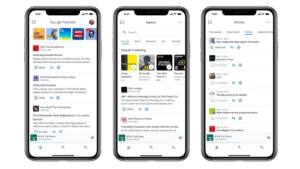Content creation has become a rapidly evolving field, with new technologies constantly reshaping the landscape. One of the most exciting and promising developments in recent years has been the rise of Artificial Intelligence (AI) and its potential impact on content creation. AI has the ability to automate and augment various aspects of content creation, from generating ideas to creating and optimizing content, and even analyzing performance data. In this long-form post, we will explore how content creators can leverage the use of AI for content creation, discussing the potential benefits, challenges, and best practices for incorporating AI into content creation workflows.
What is AI and How Does it Work?
Artificial Intelligence refers to the ability of a machine or computer program to imitate intelligent human behavior, such as learning, problem-solving, decision-making, and language processing. AI systems can analyze and process large amounts of data, identify patterns and trends, and make predictions or generate content based on the analyzed data.
There are various approaches to AI, including machine learning, natural language processing, and computer vision. Machine learning is a subset of AI that involves the use of algorithms and statistical models to enable machines to learn from and make predictions or decisions based on data. Natural language processing (NLP) is a branch of AI that focuses on enabling machines to understand, interpret, and respond to human language. Computer vision is a field of AI that enables machines to interpret visual information from the world, such as images or videos.
AI in Content Creation: Potential Benefits
The use of AI in content creation offers several potential benefits for content creators, including increased efficiency, enhanced creativity, and improved performance. Here are some ways in which content creators can leverage the use of AI for content creation:
Idea Generation: AI can help content creators generate ideas for content by analyzing data, identifying trends, and providing insights on popular topics or keywords. For example, AI-powered tools can analyze social media trends, search engine queries, and user behavior to identify content ideas that are likely to resonate with the target audience.
Content Creation: AI can assist in creating content by automating tasks such as content generation, content curation, and content optimization. For instance, AI-powered tools can automatically generate written content, create visual assets, and even edit videos based on predefined templates or algorithms. This can help content creators save time and effort in creating content, especially for repetitive or time-consuming tasks.
Personalization: AI can enable content creators to deliver personalized content to their audience based on their preferences, behavior, or demographics. For example, AI-powered recommendation engines can analyze user data and provide personalized content recommendations, improving user engagement and retention.
Content Optimization: AI can analyze performance data and provide insights on how to optimize content for better results. For example, AI-powered analytics tools can analyze data on user engagement, conversion rates, and other performance metrics to provide recommendations on how to improve content performance and achieve better outcomes.
Automation of Social Media Management: AI can automate social media management tasks, such as scheduling posts, optimizing posting times, and analyzing social media performance data. AI-powered social media management tools can help content creators save time and resources in managing their social media presence, while also improving their social media strategy based on data-driven insights.
Improved User Experience: AI can enhance the overall user experience by enabling content creators to create more engaging and interactive content. For example, AI-powered chatbots or virtual assistants can provide personalized recommendations, answer user queries, and offer interactive experiences, enhancing user engagement and satisfaction.
Enhanced Creativity: AI can spark creativity by providing content creators with new ideas, insights, and perspectives. For example, AI-powered tools can analyze data from different sources and generate creative suggestions for content topics, formats, or styles. This can inspire content creators to think outside the box and come up with unique and innovative content ideas that may not have been possible without the use of AI.
Challenges of Using AI in Content Creation
While the use of AI in content creation offers many benefits, there are also challenges and ethical considerations that content creators need to be aware of. Here are some challenges of using AI in content creation:
Quality Control: While AI can automate content creation tasks, it may not always produce content of the same quality as human-created content. Content creators need to ensure that the AI-generated content meets their quality standards and aligns with their brand voice and tone.
Ethical Considerations: Content creators need to be mindful of the ethical implications of using AI in content creation. For example, AI-generated content may raise concerns about plagiarism, copyright infringement, and the originality of the content. Content creators need to be transparent with their audience about the use of AI in their content and ensure that it complies with relevant laws and regulations.
Bias and Fairness: AI systems can perpetuate bias and discrimination if not properly designed and trained. Content creators need to be aware of the potential biases in AI-generated content and take steps to minimize them. This includes carefully selecting and training AI models, validating the output for fairness, and ensuring that the content represents diverse perspectives and voices.
Human Touch: Content creation is an art that requires human creativity, emotions, and experiences. While AI can automate certain tasks, it cannot fully replace the human touch in content creation. Content creators need to strike a balance between leveraging AI for efficiency and maintaining their unique creative perspective in their content.
Data Privacy and Security: The use of AI in content creation involves the collection and analysis of large amounts of data. Content creators need to ensure that the data used for AI-generated content is collected and stored securely and in compliance with relevant data privacy regulations. They also need to be transparent with their audience about the data collection practices and ensure that their content protects user privacy.
Best Practices for Using AI in Content Creation
To effectively leverage the use of AI in content creation, content creators can follow these best practices:
Understand the Limitations of AI: Content creators need to have a clear understanding of the capabilities and limitations of AI in content creation. They should carefully select AI-powered tools that align with their content creation goals and requirements.
Choose Reliable AI Tools: Content creators should choose reliable and reputable AI-powered tools for their content creation workflows. They should research and evaluate different AI tools, read reviews, and seek recommendations from trusted sources before incorporating them into their content creation process.
Validate and Edit AI-Generated Content: Content creators should carefully review and edit AI-generated content to ensure its quality, accuracy, and alignment with their brand voice and tone. They should not solely rely on AI-generated content without human review and editing.
Train AI Models with Relevant Data: Content creators should train AI models with relevant and diverse data to improve their accuracy and reduce bias. They should use high-quality data that reflects the diversity of their target audience and avoids bias or discrimination.
Be Transparent with Your Audience: Content creators should be transparent with their audience about the use of AI in their content creation process. They should clearly disclose the use of AI-generated content and explain how it is used to enhance their content.
Keep Human Creativity at the Core: Content creators should remember that AI is a tool to assist and augment their creativity, not replace it. They should maintain their unique creative perspective in their content and use AI as a tool to enhance their creativity and efficiency.
Regularly Evaluate and Optimize AI Tools: Content creators should regularly evaluate the performance and effectiveness of AI tools in their content creation process. They should assess whether the AI-generated content aligns with their content goals, meets their quality standards, and resonates with their audience. If necessary, they should optimize and fine-tune the AI tools to improve their performance and ensure that they continue to add value to their content creation process.
Monitor for Bias and Fairness: Content creators should be vigilant in monitoring the output of AI-generated content for potential biases and unfairness. They should regularly review the content for any unintended biases or discriminatory language and take corrective measures to address them. This includes adjusting the training data, modifying the AI models, or manually editing the content to eliminate any biased or discriminatory content.
Prioritize User Privacy and Data Security: Content creators should prioritize user privacy and data security in their use of AI for content creation. They should ensure that the data used for AI-generated content is collected and stored securely, and comply with relevant data privacy regulations. Content creators should also be transparent with their audience about their data collection practices and provide clear information about how the data is used to create content.
Stay Updated with AI Advancements: AI technology is constantly evolving, and content creators need to stay updated with the latest advancements in AI. They should regularly research and explore new AI-powered tools, techniques, and applications that can enhance their content creation process. Staying updated with AI advancements can help content creators stay ahead of the curve and leverage the latest innovations in AI for their content creation.
AI has emerged as a powerful tool for content creators to enhance their content creation process and unlock new possibilities. From automating repetitive tasks to generating creative ideas, optimizing content for SEO, and personalizing content for individual users, AI has the potential to revolutionize the way content is created, distributed, and consumed.
By leveraging the use of AI in content creation, content creators can benefit from increased efficiency, enhanced creativity, and improved audience engagement. However, content creators need to be mindful of the limitations, ethical considerations, and potential biases associated with using AI in content creation. They should follow best practices, validate and edit AI-generated content, prioritize user privacy and data security, and ensure that the human touch remains at the core of their content creation process.
As AI technology continues to advance, content creators need to stay updated and adapt their content creation strategies to harness the full potential of AI. By embracing AI as a powerful tool, content creators can create compelling, engaging, and personalized content that resonates with their audience and drives meaningful results. The future of content creation is evolving with AI, and content creators who embrace this technology are likely to stay ahead of the competition and deliver exceptional content experiences to their audience.




